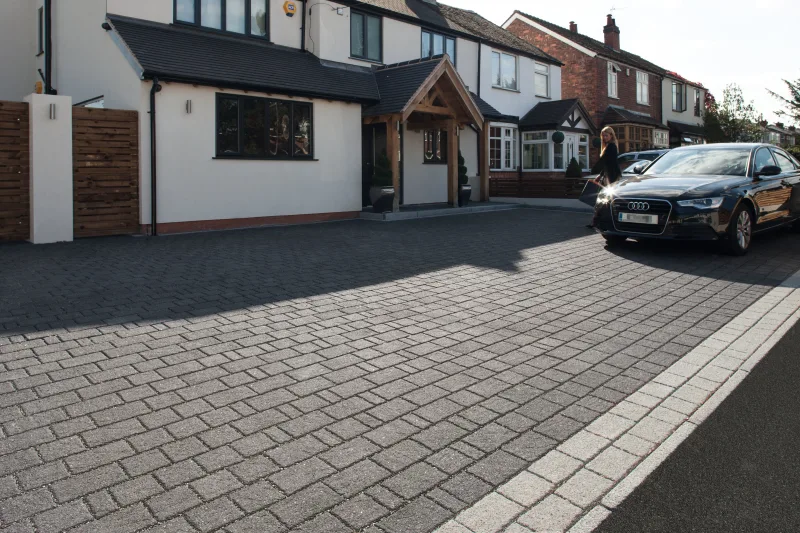Blog
Do You Need Planning Permission for a Driveway?
A landscaped driveway can really add some wow factor to your home’s exterior, adding structure, depth and practicality to the whole area.
But before you start designing or laying your dream driveway, you need to make sure you’re following all the relevant rules and regulations.
Here, we explain everything you need to know about driveway legislation in the UK, including planning permission guidelines and the driveway types that are most likely to sail through the application process.
What is planning permission?
Planning permission, also known as planning consent or statutory approval, is the legal approval required from a local planning authority (LPA) before you can carry out certain types of development or construction work on your home or property.
The purpose of the planning permission system is to regulate the development and use of land in the public interest, ensuring that it is carried out in an orderly and sustainable manner while considering factors such as environmental impact, infrastructure, and the character of the local area.
Even though planning permission can sometimes feel frustrating, it’s an important system that helps to preserve the look and feel of neighbourhoods for the benefit of everyone.
When you do need planning permission for a driveway
In the UK, you generally need to obtain planning permission for driveway projects in the following scenarios:
Creating a new driveway
If you plan to construct a driveway where one did not previously exist, you will likely need to apply for planning permission from your local planning authority. This is especially important if the new driveway involves creating a new access point or crossing from a public road or highway. In all cases if in doubt ask your local council who will advise if you require permission or not.
Widening an existing driveway
Significantly increasing the width of your existing driveway may require planning permission, especially if the widening work involves removing boundary walls, fences, or vegetation that could impact your neighbours' home.
Altering the driveway's access to a public road
The Department for Levelling Up, Housing and Communities (DLUHC) states that any changes to the driveway's access point, such as creating a new entrance or exit onto a public road or highway, will typically require planning permission from your local council. Also if you require a dropped kerb to gain access to your new wider drive that will always require planning permission from your local council.
Using non-porous or semi-porous surfacing materials
If you plan to use non-porous surfacing materials (e.g. tarmac or concrete) for a new or replacement driveway with an area greater 5m2, you may need to obtain planning permission. This is because non-porous surfaces can increase the risk of surface water runoff and flooding, which could cause issues for others in the area.
Driveways in specific areas
In certain areas, such as conservation areas, areas of outstanding natural beauty, or properties with listed building status, there may be stricter planning regulations in place. In these cases, you may need planning permission even for relatively minor driveway alterations.
The planning permission application process
If planning permission is required, contact your local planning authority (LPA), which is usually your local council.
The LPA will assess your application based on local regulations and planning objectives, but they may request additional information or drawings to support your request.
If approved, you will receive planning permission and can proceed with constructing the driveway according to the approved plans and any conditions imposed.
If rejected, you can modify and resubmit the application or appeal the decision.
It’s crucial to obtain the necessary permissions before laying a new driveway, as anything you do that hasn’t been approved (even unapproved alterations to a plan) could land you fines or even orders to undo the work completely.
When you don’t need planning permission for a driveway
Repairing or resurfacing an existing driveway
If you’re only doing repairs or resurfacing work on an existing driveway, and the size, materials, and access point remain unchanged, you typically don't need planning permission. However, you still need to comply with building regulations related to drainage and surface water management.
Using permeable or porous surfacing materials
If you use permeable paving or porous surfacing materials such as gravel, permeable concrete block paving, or porous asphalt for a new or replacement driveway, you generally don't need planning permission, regardless of the project size!. This is because permeable surfaces allow water to drain away naturally, reducing the risk of surface water runoff.

This is Argent Priora, a permeable driveway that won't have needed planning permission.
Driveway projects within permitted development rights
In some cases, certain driveway projects may fall under permitted development rights, so you don't need to apply for planning permission.
However, the project must comply with specific conditions and limitations outlined in the permitted development regulations. These conditions may include restrictions on the driveway's area, materials, and proximity to boundaries or highways.
Minor changes or adjustments
Small alterations or adjustments to an existing driveway (such as changing the gradient, adding or removing driveway edging stones, or making minor changes to the layout) may not require planning permission as long as the overall size and access point remain unchanged.
Driveways from Marshalls
Marshalls is the UK’s leading provider of hard landscaping materials for gardens, driveways and building projects. Our teams supply high-quality stone, paving slabs and block paving for driveways and patios up and down the country, with a stunning collection of styles available to buy online.
Explore our range of permeable paving for driveways to find the perfect stone for your home’s outdoor spaces. Then, browse our directory to find an accredited garden and driveway installer local to you.
Unsure which driveway material or colour is right for you? Use our award-winning Outdoor Reality app to visualise and compare different options in your space.










